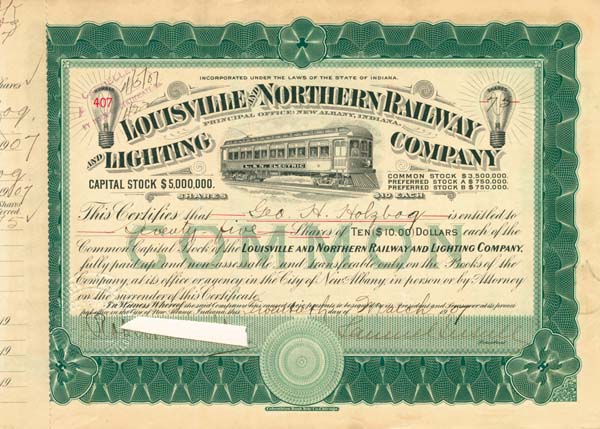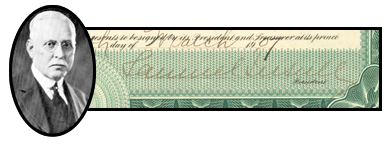Samuel Insull autographed Louisville and Northern Railway and Lighting Co. - Stock Certificate (Uncanceled)
Inv# AG1372 Stock

Samuel Insull (1859-1938) was an investor who was known for purchasing utilities and railroads. He contributed to creating an integrated electrical infrastructure in the United States. He was also responsible for the building of the Chicago Civic Opera House in 1929.
At the age of 21, Insull caught the attention of Thomas Edison while working for Edison's business representative in London. Edison offered him a job as his personal secretary, and Insull immigrated from England to the U. S. in 1881. In the decade that followed, he took on increasing responsibilities in Edison's business endeavors, building electrical power stations throughout the U. S. With several other Edison Pioneers, he founded Edison General Electric, which later became the publicly held company named General Electric.
Insull began purchasing portions of the utility infrastructure of the city of Chicago. When it became clear that Westinghouse's support of alternating current was to win out over Edison's direct current, Insull switched his support to alternating current. As a result of owning all these diverse companies, Insull is credited with being one of the early proponents for regulation of industry. He used economies of scale to overcome market barriers by cheaply producing electricity with large steam turbines. This made it easier to put electricity into homes.
A natural outgrowth of electric utility companies was their ownership or acquisition of electric railroads such as interurbans and streetcar systems, which were large electricity consumers. Insull acquired and rehabilitated during the 1910s and 1920s the major Chicago area interurbans (North Shore Line, South Shore Line, and the Chicago, Aurora, and Elgin) and the rapid transit lines which were merged into the Chicago Rapid Transit Company. Without Insull's immediate capital improvements it is unlikely that these interurbans would have survived the Great Depression. Insull's generous civic spirit and love for the Chicago area also seemed to motivate this desire to acquire and improve these electric lines as much as bottom line profit possibilities.
In Illinois, Insull had long battled with Harold L. Ickes over concerns that Insull was exploiting his customers. Upon the promotion of Ickes to Interior Secretary in 1933, Insull had a powerful foe in the Roosevelt administration. Due to the highly leveraged structure of Insull's holdings (he invented the holding company and controlled an empire of $500 million with only $27 million in equity), his holding company collapsed during the Great Depression, wiping out the investment of 600,000 shareholders. This led to the enactment of the Public Utility Holding Company Act of 1935.
Insull fled the country to Greece, but was later extradited back to the United States by Turkey to face federal prosecution on mail fraud and antitrust charges. He was defended by famous Chicago lawyer Floyd Thompson and found not guilty on all counts.
He is reputed to have died penniless, but he did not. The myth started when his corpse was looted by a Parisian for his wallet.
A stock certificate is issued by businesses, usually companies. A stock is part of the permanent finance of a business. Normally, they are never repaid, and the investor can recover his/her money only by selling to another investor. Most stocks, or also called shares, earn dividends, at the business's discretion, depending on how well it has traded. A stockholder or shareholder is a part-owner of the business that issued the stock certificates.









Ebay ID: labarre_galleries